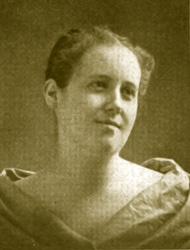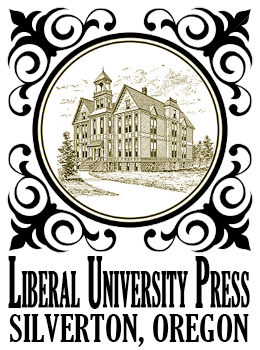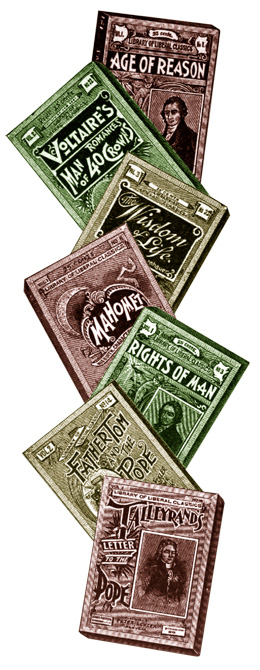By Ida Ballou — September, 1902
 Sidney, Ohio: Says Goethe:
Sidney, Ohio: Says Goethe:
The world’s my delight; I gazed on the distant,
I look on the near, On wood and on planet,
On field and on deer, And the beauty eternal
Of all things I see, And pleased with myself.
All bring pleasure to me.
Glad eyes look around you, And gaze—for whate’er
Of right they encounter, It still hath been dear.
And the German poet merely gave an optimistic turn to the glass through which he looked. The things he saw were just the same as with the old countryman who declared—
“Things was gettin’ wuss and wuss, The country’s in a dreadful muss.”
Only this fellow had a pessimistic lens.
Things are so essentially what we make them. The world is created by us. We turn it into a palace or prison, as we will. The conditions under which we are struggling and which handicaps us can be helped so much by a kaleidoscopic turn of our glass, and a persistent effort to focus our eyes on the beautiful. What we will to see we do see! Don’t you believe it? Take this dismal day, for example. Let us go into a dismal part of this great city, where the mud and wet is accentuated by still more dirt and squalor, where opportunities for human beings to rise above a sordid level are discouragingly few. What do you see here?
When you have gotten over that first feeling I think we all have on such as these—the feeling of thankful self-congratulation that you are something better, and are therefore living better, you will begin to observe details. Do you see that pale-faced woman toiling over her work, with little children around her? No, I do not know her, or the story of her life.
But isn’t it plain enough? Is she not toiling for her children, when you know and I know she could avoid it if she would? Is there any nobler love among your aristocratic neighbors? And here is a little girl bringing home her work, with the invalid mother sitting by the window, trying to get the benefit of all the fresh air she can-mother supporting children; children supporting parents; kind-hearted ladies upon humane errands alleviating by gifts a little of the burden. Can you not see some beauty here, dear friend?
Life is so essentially what we make it. Come then, shall we sit down and make mouths at the outside world, ranting about the falseness and hypocrisy of it all, or look persistently for beauty with love and tolerance in our hearts? Which makes the pleasant companion, which the disagreeable friend whom we try so hard to like?
Nay, you must use your rose-colored glass; you must create your own beauty and symmetry; you must see good in order to do good, and you must do good or be a drone in this busy old world hive.
Don’t you know that not only does our mental attitude affect us physically and mentally, but we send out vibrations; we affect others; we help form their lives—in a measure we are responsible for their welfare. If your friend fails, it was because you “knew he would.” “I told you so!” What a mean triumph there has ever been in that exclamation! “Aye, you have told me so, and your affirmation has produced the result—on your head be it.”
There is no limit to human usefulness and responsibilities. There is no stepping-off place in our efforts to grow better, and there is no way to grow better than to try to see good in this our world. So no matter what your experience has been, no matter what your ideas are, iconoclastic or otherwise, if you will only try to appreciate the work of others, and see good in all they do, you will further your own. “In union is strength.” Remember this: Every idea emanating from the brain of man has some portion of truth in it. Every action that in any small way can help another has something good to commend it, and deserves your sympathy and encouragement.
“Every good thought ever spoken, Every grand deed ever done, Is a fresh sword making surer That our conquest will be won, Conquest over superstition That hath ruled and ruined long, Conquest of the captive people over Mailed and mitered wrong.”





